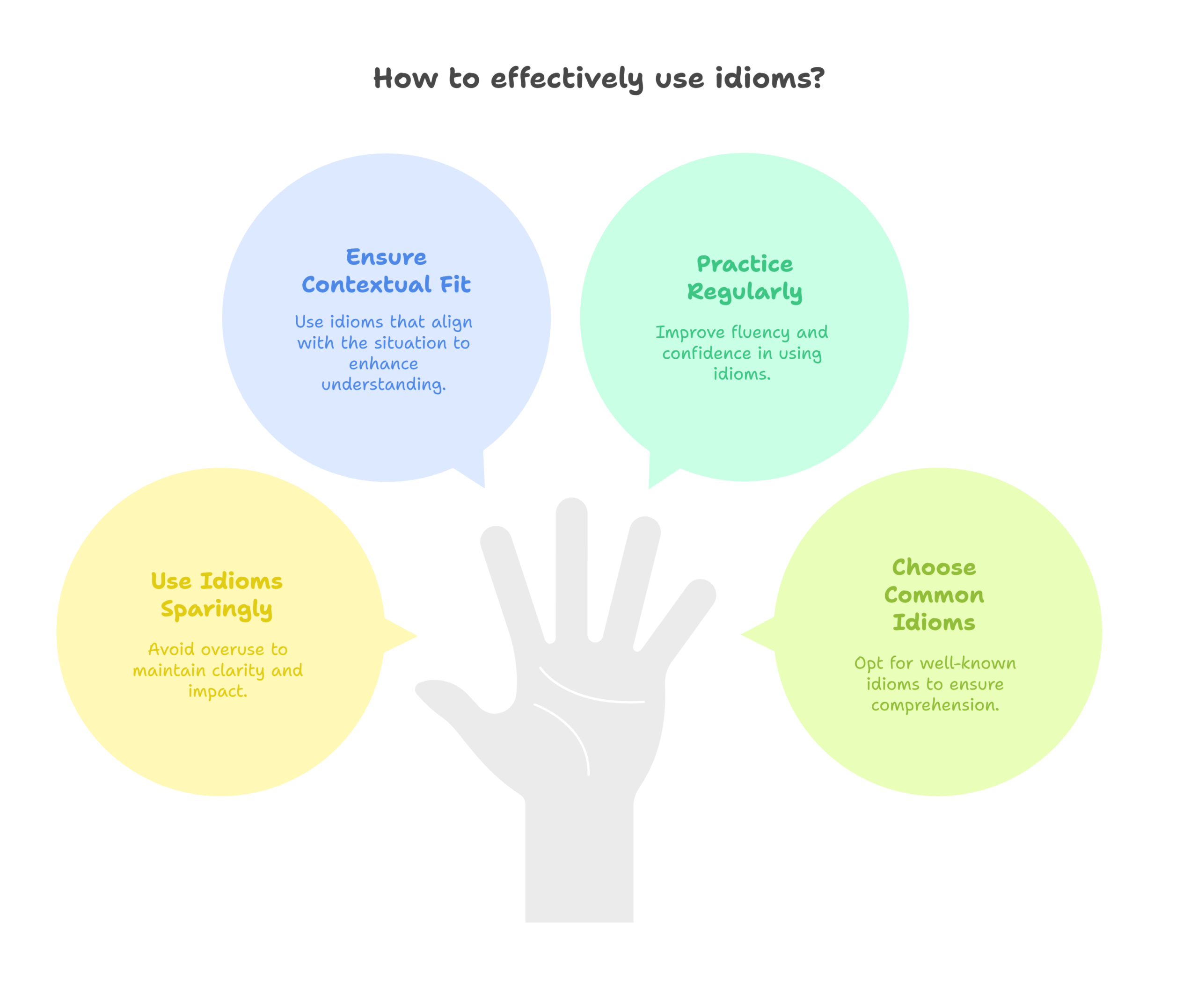Table of Contents
Speaking naturally in English is not always easy. It takes more than grammar and vocabulary. That’s where Idioms for IELTS Speaking come in handy. They help your answers sound more fluent and real. Using idioms shows that you know everyday English. It also gives you a higher chance at Band 7+. So, learning them is totally worth your time. Food Idioms for IELTS Speaking are fun and easy to remember. These idioms often appear in daily conversations. Using them shows confidence and strong vocabulary skills.
This blog will focus on food-related idioms. These are fun, common, and easy to use. You can fit them into many speaking answers. We’ll explain each idiom with meaning and examples. You’ll also learn when to use them. Let’s make your speaking more tasty and natural!
Key Takeaways
-
Food idioms add flavor to your IELTS answers
-
Use 2–3 idioms per speaking test section
-
Make sure each idiom fits the context
-
Practice using them in real speaking examples
-
Avoid overusing or forcing idioms into answers
Master the IELTS Exam with Online Coaching – Enroll Today!
Food Idioms for IELTS Speaking: Introduction
Using idioms can make your speech sound natural. They help you speak like a native English speaker. In the IELTS Speaking test, this makes a big difference. Idioms show you’re confident and comfortable with the language. They add color and expression to your answers. Examiners often notice idioms used in the right context. This helps boost your fluency and vocabulary scores.
Fluency is not just about speaking quickly. It’s about using words that fit naturally in conversation. Idioms show you understand how English is really used. They also help you avoid repeating simple words. That’s why learning idioms is a smart move.
Today, we’ll focus on food-related idioms. These idioms are common and easy to remember. You can use them in many speaking topics. They are great for stories, opinions, and daily routines. So let’s explore the best food idioms for IELTS!
What Are Idioms and Why Use Them in IELTS?
1: Most university students ........................ on campus in their first year.
📘 What Are Idioms?
Idioms are fixed expressions with hidden meanings. They don’t mean what the words directly say. For example, “spill the beans” means reveal a secret. It has nothing to do with real beans. These phrases are often used in native conversations. Idioms help you sound natural and fluent.
📝 Why Use Idioms in IELTS?
Idioms can help you boost your speaking score. They show your range of vocabulary and expression. Examiners look for natural, fluent English in answers. Using idioms smartly can raise your fluency band. But they must be used in the right context. Forced idioms may hurt your performance instead.
🎯 Band 7+ and Idioms: Key Requirements
To score Band 7+, your speech must be natural. You need a wide range of vocabulary and phrases. Idioms are proof of strong lexical resource.
Here’s a simple table to understand how idioms help:
| IELTS Criteria | How Idioms Help |
|---|---|
| Fluency and Coherence | Add flow and natural expression |
| Lexical Resource | Show a variety of advanced vocabulary |
| Grammatical Range | Used in proper sentence structures |
| Pronunciation | Used in speech rhythm and stress patterns |
In Short
-
Idioms are natural, fixed phrases with special meanings
-
Using them correctly shows fluency and vocabulary control
-
They help you move from Band 6 to Band 7+
-
Practice using idioms in real speaking situations
-
Today, we’ll focus on food idioms for IELTS success
15+ Common Food Idioms for IELTS Speaking
Idioms make your English sound fluent and expressive. Food idioms are popular and easy to use. You can apply them in daily conversation topics
Below are 15+ food idioms with clear meaning, examples, and tips.
📘 Idiom Breakdown Table
| Idiom | Meaning | Use Context |
|---|---|---|
| Piece of cake | Something very easy | Talking about preparation |
| Spill the beans | Reveal a secret | Stories or surprises |
| Hot potato | Sensitive issue | Controversial discussion |
| Take with a grain of salt | Don’t believe fully | Doubtful information |
| In a nutshell | In short | Summarizing opinions |
| Bring home the bacon | Earn money | Jobs or family income |
| Butter someone up | Flatter for gain | Stories or persuasion |
| Cry over spilled milk | Regret past mistakes | Talking about failures |
| Couch potato | Lazy TV watcher | Describing routines |
| Big cheese | Important person | Describing authority figures |
| Sell like hotcakes | Sell quickly | Product or trend discussions |
| Too many cooks | Too many opinions spoil | Teamwork or group issues |
| Not my cup of tea | Don’t enjoy it | Talking about dislikes |
| Bite off more than chew | Take too much work | Stress or overcommitment |
| Full of beans | Very energetic | Describing someone lively |
Now, let’s explore each idiom in detail:
🍰 1. Piece of Cake
-
Meaning: Something very easy
-
Example: The IELTS reading test was a piece of cake.
-
Context Tip: Use when talking about easy tasks.
🫘 2. Spill the Beans
-
Meaning: To reveal a secret
-
Example: He spilled the beans about the surprise party.
-
Context Tip: Use in stories or gossip topics.
🥔 3. Hot Potato
-
Meaning: A difficult or sensitive topic
-
Example: Politics is a hot potato in my country.
-
Context Tip: Use in opinion-based discussions.
🧂 4. Take with a Grain of Salt
-
Meaning: Don’t fully believe it
-
Example: I take online reviews with a grain of salt.
-
Context Tip: Use when expressing doubt.
🥜 5. In a Nutshell
-
Meaning: In short or briefly said
-
Example: In a nutshell, I love city life.
-
Context Tip: Use while summarizing ideas.
🥓 6. Bring Home the Bacon
-
Meaning: Earn income for the family
-
Example: My sister brings home the bacon now.
-
Context Tip: Use in job or work discussions.
🧈 7. Butter Someone Up
-
Meaning: Flatter someone for favor
-
Example: He buttered up his teacher before the exam.
-
Context Tip: Use in persuasive situations.
🥛 8. Cry Over Spilled Milk
-
Meaning: Regret what can’t be changed
-
Example: There’s no point crying over spilled milk now.
-
Context Tip: Use for past mistakes.
🛋️ 9. Couch Potato
-
Meaning: A lazy person watching TV
-
Example: He became a couch potato during holidays.
-
Context Tip: Use when discussing routines or habits.
🧀 10. Big Cheese
-
Meaning: An important or powerful person
-
Example: She’s the big cheese at her firm.
-
Context Tip: Use in career-related topics.
🧁 11. Sell Like Hotcakes
-
Meaning: Sell fast and in high quantity
-
Example: The new phones sold like hotcakes yesterday.
-
Context Tip: Use in shopping or product talks.
🍲 12. Too Many Cooks Spoil the Broth
-
Meaning: Too many people ruin the result
-
Example: The project failed—too many cooks involved.
-
Context Tip: Use in group work examples.
🍵 13. Not My Cup of Tea
-
Meaning: Not something you like
-
Example: Waking early is not my cup of tea.
-
Context Tip: Use in Part 1 preferences.
🦷 14. Bite Off More Than You Can Chew
-
Meaning: Take more work than you can handle
-
Example: I bit off too much last semester.
-
Context Tip: Use for stress or time issues.
🫘 15. Full of Beans
-
Meaning: Very energetic and active
-
Example: My nephew is always full of beans.
-
Context Tip: Use when describing kids or energetic people.
Master the IELTS Exam with Online Coaching – Enroll Today!
Ace Your IELTS Exam with Confidence!
Unlock your potential with our expert-led IELTS preparation course. Achieve your dream score and open doors to global opportunities!
Start Your IELTS Journey Today!How to Use Food Idioms in IELTS Speaking Answers
Using food idioms can boost your speaking score. They show fluency and make your answers sound natural. But you must use them in the right place. Let’s look at how to use them in all parts.
Part 1: Personal Questions
This section includes simple daily life questions. Topics include hobbies, routines, likes, and dislikes.
Tips to Use Idioms in Part 1:
-
Keep it casual and natural.
Don’t force idioms into every sentence. -
Use when sharing habits or feelings.
| Sample Question | Answer with Idiom |
|---|---|
| Do you like cooking? | Yes, but not my cup of tea. |
| How do you relax? | I become a couch potato at night. |
| Is English easy for you? | Reading is a piece of cake now. |
Use short idioms to sound fluent and relaxed.
Part 2: Cue Card Story
This section asks you to speak for 2 minutes. You describe a person, event, place, or habit. You must add detail and connect your ideas well.
Tips to Use Idioms in Part 2:
-
Use 2–3 idioms, spaced throughout the story.
-
Make them match the tone of your answer.
-
Use idioms to describe feelings, people, or results.
Example Use:
“I started studying late and bit off more than I could chew. But after practice, it became a piece of cake. My friend helped me a lot, always full of beans.”
Where Idioms Fit:
| Idiom | Use |
|---|---|
| Bit off more… | Start of story (struggles) |
| Piece of cake | Middle (improvement) |
| Full of beans | End (supportive friend) |
Part 3: Opinions/Discussions
This part includes deeper questions on big topics. You may speak about education, technology, society, etc. Use idioms to express opinions or explain ideas clearly.
Tips to Use Idioms in Part 3:
-
Use idioms for strong or clear opinions.
-
Add idioms when discussing common situations.
| Sample Question | Answer with Idiom |
|---|---|
| Do people work too much today? | Yes, many bite off more than they chew. |
| Is teamwork important? | Yes, but too many cooks can spoil results. |
| Should students follow trends? | Not always. Take trends with a grain of salt. |
Use one idiom per answer to keep it natural.
Final Tip
Use idioms to add color, not confusion. Make sure each idiom fits the question theme.
Sample IELTS Speaking Answer Using Food Idioms
Let’s see how food idioms work in a real answer. This is a Part 2 Cue Card sample. The answer includes 4 food idioms used naturally. You’ll also see where and why each idiom fits.
Cue Card:
Describe a time you prepared for something challenging.
You should say:
-
What it was
-
How you prepared
-
What challenges you faced
-
And explain how you felt after it
Sample Answer:
Last year, I prepared for my IELTS exam. At first, I bit off more than I could chew. I joined many classes and felt very stressed. Sometimes, I cried over spilled milk at night. But with time, reading became a piece of cake. My friend supported me and kept me motivated. Finally, I passed and brought home the bacon. That moment felt amazing and made me proud.
Idiom Breakdown Table
| Idiom | Where Used | Why It Fits |
|---|---|---|
| Bite off more than I could chew | Start (struggles) | Shows taking on too much at once |
| Cry over spilled milk | Middle (stress phase) | Reflects regret and emotional moments |
| Piece of cake | Middle (progress phase) | Describes how things got easier |
| Bring home the bacon | End (result phase) | Means achieving success or reaching the goal |
Quick Tip:
Use only a few idioms per answer. Place them where they feel natural and smooth.
Tips to Use Idioms Naturally
Food idioms make your English sound fluent and lively. But using them incorrectly can lower your band score. Follow these tips to sound natural and confident.
❌ 1. Avoid Overusing Idioms
Too many idioms can confuse your listener. Use 2–3 idioms in the whole speaking test. Only include them where they really add meaning. Think of idioms like spices in cooking. Too much can spoil your answer’s flavour.
Tip:
✔ Use them to highlight, not to decorate everything.
✘ Don’t use an idiom in every sentence.
🎯 2. Make Sure They Fit the Context
Each idiom has a specific mood and tone. Check if it suits the topic and emotion. “Couch potato” works for habits, not formal discussions. “Bring home the bacon” suits job or success stories. Learn where each idiom sounds most natural.
Example:
-
❌ “My school trip was full of beans.” (Odd)
-
✔ “My little brother is always full of beans.” (Right)
🛑 3. Don’t Force Idioms Into Every Answer
If it doesn’t fit, just leave it out. A simple, clear sentence is always better. Forced idioms may sound strange or incorrect. Only use idioms you truly understand well.
Example:
-
❌ “I went to the market. It was a hot potato.”
-
✔ “Talking about politics is a hot potato.”
✅ Final Tip
- Practice each idiom in sample answers.
- Use it while speaking, not just in writing.
- The more natural it feels, the better it sounds.
Ace Your IELTS Exam with Confidence!
Unlock your potential with our expert-led IELTS preparation course. Achieve your dream score and open doors to global opportunities!
Start Your IELTS Journey Today!Food Idioms for IELTS Speaking: Conclusion
Using food idioms for IELTS Speaking boosts your fluency. They help your English sound natural and expressive. These idioms are fun and easy to remember too. They fit well in casual and test conversations. But remember to use them with clear purpose. One or two idioms are usually enough. Practice them in speaking before the test day. Overuse or wrong use can reduce your score.
So, choose the right idioms for each question. Use them in stories, examples, or opinions. Let the idioms blend with your speaking style. Don’t rush to add too many at once. Quality of expression matters more than quantity. Focus on clear, confident, and fluent speech. With practice, idioms will come out naturally.
Ace Your IELTS Exam with Confidence!
Unlock your potential with our expert-led IELTS preparation course. Achieve your dream score and open doors to global opportunities!
Start Your IELTS Journey Today!Frequently Asked Questions
What are food idioms in English?
Food idioms are expressions that include food-related words but have non-literal meanings. For example, “piece of cake” doesn’t refer to actual cake—it means something is very easy. These idioms are often used in casual English to express ideas in a colorful and natural way.
Why should I use idioms in the IELTS Speaking test?
Using idioms in IELTS Speaking helps show your fluency, natural language use, and comfort with spoken English. Examiners reward students who can use idiomatic language accurately because it demonstrates a higher command of English, especially for Band 7 and above.
Can using too many idioms hurt my IELTS score?
Yes. Overusing idioms or using them incorrectly can confuse your message or sound unnatural. This might negatively affect your lexical resource and coherence scores. It’s best to use 1–2 idioms naturally in each part of the speaking test.
Which parts of the IELTS Speaking test are best for idioms?
Idioms can be used in all three parts:
-
In Part 1, use them to describe habits or preferences (e.g., “I’m a real couch potato on weekends”).
-
In Part 2, use idioms to make your story engaging (e.g., “Studying every day became a piece of cake”).
-
In Part 3, use idioms when giving opinions (e.g., “That topic is a real hot potato”).
Do I need to explain the idioms during the test?
No, you don’t need to explain the idioms. The examiner is already familiar with them. What matters is how naturally and correctly you use the idioms in your answers. If used properly, idioms can strengthen your speaking score without needing explanation.
How can I learn and remember food idioms easily?
Start by learning one idiom at a time. Make flashcards with the idiom, its meaning, and an example sentence. Practice speaking with them in context. Try using them in everyday conversations or mock speaking tests. Watching English shows and reading helps too!
What are some common food idioms to avoid?
Avoid idioms that are outdated, culturally inappropriate, or too obscure. For example, expressions like “as cool as a cucumber” or “have bigger fish to fry” are fine, but not always relevant in IELTS topics. Stick to simple, clear, and modern idioms like “spill the beans” or “not my cup of tea.”
How many food idioms should I learn for IELTS Speaking?
You don’t need to memorize hundreds of idioms. Learning 15–20 commonly used food idioms is enough. Focus on quality over quantity. Know their meanings, use-cases, and practice them aloud so you feel confident using them in real speaking situations.
Will using idioms guarantee a Band 7 or above?
Idioms alone won’t guarantee a Band 7. However, when used correctly, they support the lexical resource criteria. You also need to show fluency, coherence, grammar accuracy, and good pronunciation. Idioms help enhance your score, but they must be used wisely and sparingly.
Can I use food idioms in IELTS Writing too?
It’s better to avoid idioms in formal writing (like Task 2 essays). IELTS writing values formal tone and clear arguments. Idioms can seem too informal or vague for academic writing. However, for informal letters in Writing Task 1 (General Training), some idioms may be acceptable if used appropriately.











